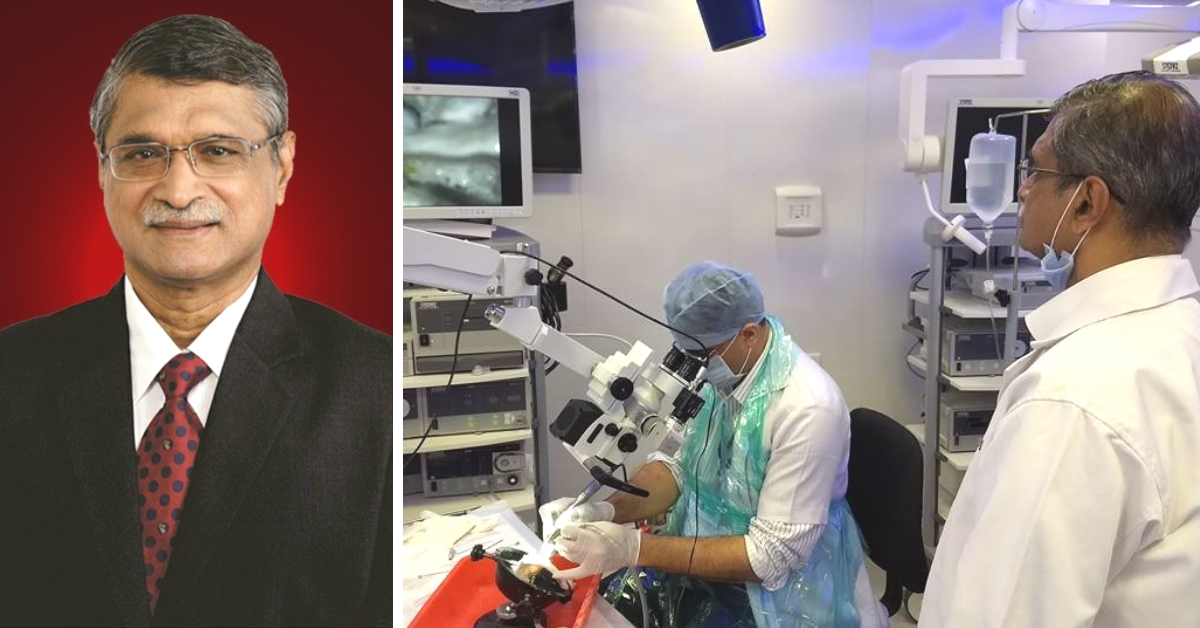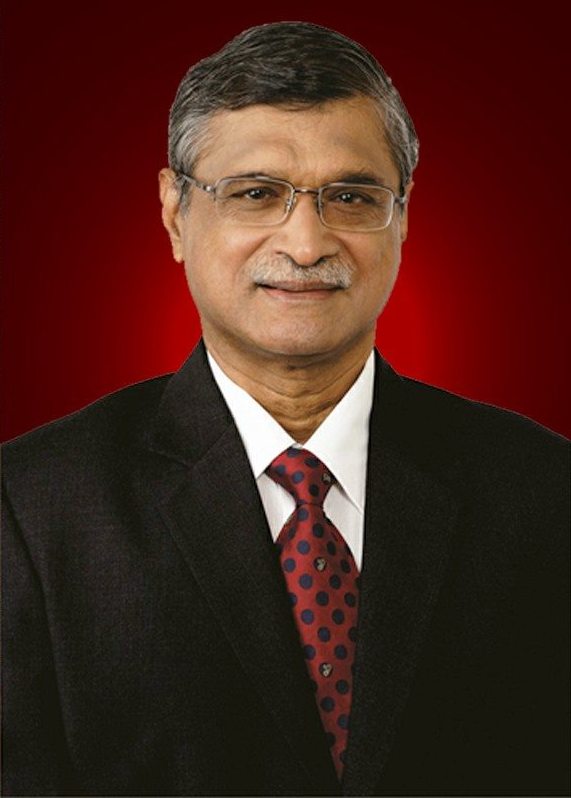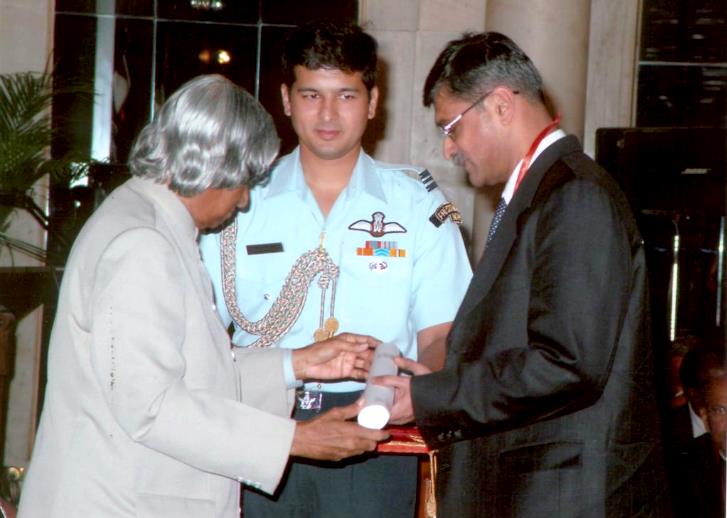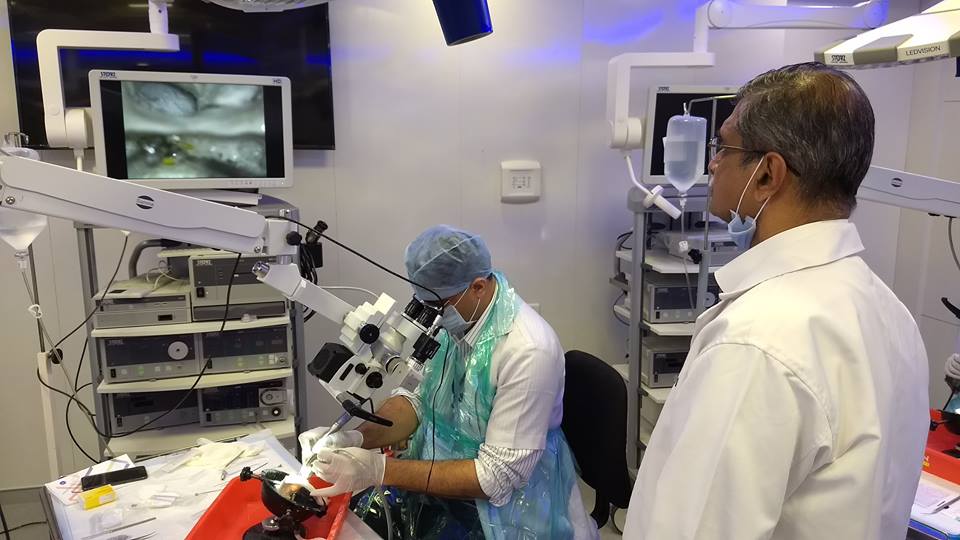This Padma-Awardee Doctor Will Tell Us Why We Need to ‘Listen’ to Our Ears!
Is there an age limit for undergoing a cochlear implant? What are the most common causes of hearing loss? An expert answers.

Health Heroes – This article is part of a series to celebrate some of India’s most amazing doctors and to understand the incredible work they are doing.
Our ears constantly collect sounds from the immediate environment and funnel them to the brain, which then makes sense of the tunes we hear and the conversations we make.
The sense of hearing is also crucial for children for learning languages, a loss of which can occur at any age – from being present at birth to occurring later in life due to infectious diseases, exposure to excessive noise, aging or accidents.
Such partial or total inability to hear affects around 466 million people worldwide, among which 34 million are children. Shockingly, it is estimated that by 2050 over 900 million people will have disabling hearing loss.
The majority of people living with disabling hearing loss are in low and middle income countries. What is the status of hearing loss in India?
In a conversation with Padma Shri awardee Dr Milind Vasant Kirtane, Dr Priyamvada Chugh discusses hearing loss among Indians, a highly under-appreciated problem.
Q: What are the most common causes of hearing loss?

A: Hearing loss is of three types: conductive, sensorineural, and mixed.
a) Conductive hearing loss occurs when sound is not conducted effectively from the outer or the middle ear of a person to their inner ear. Such lack of conduction can occur following ear infections, physical deformities in the structure of the ear or ear bones, and can even be caused due to an accumulation of wax in the ear.
b) On the other hand, sensorineural hearing loss occurs when the inner ear (known as the cochlea) or the auditory nerve, which carries sound from the inner ear to the brain, is damaged. Sensorineural loss of hearing can occur at birth due to genetic reasons or infections, and can also be attributed to infections such as toxoplasma, rubella, cytomegalovirus, and herpes in pregnant mothers. On the other hand, sensorineural hearing loss can also occur later in life due to age-related degeneration, trauma, intake of certain medications, ear infections as well as excessive exposure to loud sounds.
c) Mixed hearing loss is caused by a combination of conductive and sensorineural loss.
Q: You are the man behind over 2,000 cochlear implant surgeries in India. What is a cochlear implant in layman terms and what conditions is it needed for?
A: A cochlear implant is a surgically-implanted electronic device in individuals with severe to profound sensorineural hearing loss in one or both ears, who obtain no significant benefit with an optimally-fitted hearing aid.
The implant performs the function of the damaged portion of the inner ear, delivering electrical signals to the brain, which perceives them as sound and helps with hearing. The device has two basic parts – an external component (a microphone, a speech processor and a transmitting coil), which sits behind the ear; and an internal component (the receiver-stimulator and the electrode array), which is implanted by surgery, under the scalp behind the ear, with an electrode array that sits around the auditory nerve within the inner ear.
The external and internal parts work together, allowing the implant user to perceive sound.
Several factors determine whether a person needs a cochlear implant, such as the age at which the hearing loss occurred, its cause, the duration, hearing history, and the degree of residual hearing.
Q: Is there an age limit for undergoing a cochlear implant?

A: There is no age limit for a cochlear implant. On one hand, children below one year have been successfully implanted, on the other hand, people as old as 85 are undergoing this surgery.
Q: How much does an average cochlear implant cost? Do health insurances in India cover cochlear implants?
A: Cochlear implants are currently not manufactured in India but are imported from companies around the world. The cost of an FDA-approved implant currently ranges from Rs 6-15 lakhs.
Unfortunately, health insurances in India do not cover cochlear implant surgery. However, some of the state and central government schemes such as Assistance to Disabled Persons for Purchase (ADIP) scheme are beginning to fund cochlear implant surgeries.
Furthermore, private sector initiatives such as the Hinduja Hospital Cochlear Implant Program and ‘I Hear Foundation’ are some of the pioneering cochlear implant support programs in India, which provide financial assistance to those with a significant hearing loss.
Also Read: English, Math Training: How a Mumbai Org is Uplifting Hearing Impaired Kids
Q: What is the status of neonatal screening for deafness in India? How does it compare to practices in developed nations?
A: Sadly, universal newborn screening for hearing loss is still not a standard practice in most healthcare organisations in India. Unlike developed nations, where every newborn undergoes hearing screening immediately after birth, most Indian babies are unable to avail this facility.
Even in hospitals where newborn screening is practiced occasionally, follow-up visits for babies who do not pass the initial hearing screening remain lacking due to poor public awareness.
Q: Why is early detection of hearing loss necessary in children?

A: Intervention for hearing loss should begin as soon as the diagnosis is made so that a child can enjoy maximum benefits, including learning spoken language. The earlier a baby starts hearing languages in their environment, the sooner their language and speech will develop. Owing to this, the first two or three years of a child’s life are critical for speech and language development.
While babies with a hearing loss do not receive the same auditory input as those with normal hearing capacity, their brains are equally-equipped to learn spoken language.
Early intervention can thus help kids with a hearing loss to bring them at par with their normal-hearing peers. Hence, it is crucial that their hearing is aided as early as possible.
The Joint Committee on Infant Hearing (JCIH), recommends a 1-3-6 protocol, according to which, screening should be completed by one month of age, hearing loss diagnosed by three months of age, and intervention done no later than six months.
Q: According to the WHO, 60% of childhood hearing loss is due to preventable causes and 1.1 billion young people (aged between 12–35 years) are at risk of hearing loss. What are some ways by which these hearing losses can be prevented?
A: Whether it is hearing loss in a newborn or an adult, one should avoid the use of ear buds, exposure to loud noise and beware of ototoxic drugs to protect their ears.
Q: What research questions in the field will drive the next generation?
A: Research is on for a totally-implantable cochlear implant (TICI). In India, DRDO is currently in the process of developing an indigenous, less expensive version of the cochlear implant. Stem cell therapy, which is the use of stem cells for repairing the hearing apparatus in our ears, and thus for the treatment of hearing loss, is yet another avenue that is beginning to be studied.
Q: If there is one national policy you could change to improve the status of deafness in India, what would it be?
A: Universal newborn screening for hearing loss should be made mandatory for all babies who are born at home, in private clinics or hospitals. This can be the part of a checklist carried out before issuing a child’s birth certificate. However, only screening these children is not adequate.
Follow-up of babies who do not ‘Pass’ the screening test should be ensured, and early intervention carried out wherever necessary.
You May Also Like: Sound of Success: This Man is Empowering Thousands of Hearing Impaired!
Overall, improving methods to prevent, identify and address hearing loss can bring great benefit to individuals. In this age of increased challenges to our ears through excessive exposure to noise and frequent usage of mobile phones, it is time we “hear” what Dr Kirtane has to say.
(Edited by Shruti Singhal)
Like this story? Or have something to share?
Write to us: [email protected].
Connect with us on Facebook and Twitter.
If you found our stories insightful, informative, or even just enjoyable, we invite you to consider making a voluntary payment to support the work we do at The Better India. Your contribution helps us continue producing quality content that educates, inspires, and drives positive change.
Choose one of the payment options below for your contribution-
By paying for the stories you value, you directly contribute to sustaining our efforts focused on making a difference in the world. Together, let's ensure that impactful stories continue to be told and shared, enriching lives and communities alike.
Thank you for your support. Here are some frequently asked questions you might find helpful to know why you are contributing?


This story made me
-
97
-
121
-
89
-
167














